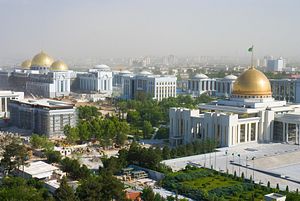While certain actors in Central Asia rang in 2015 with welcome news, others decided to greet the New Year by continuing the trend of downward economic trajectories. In a surprise move, Turkmenistan began 2015 by devaluing its currency approximately 20 percent, dropping the manta-to-dollar rate from 2.85 to 3.5 on Jan. 1.
According to Bloomberg, the devaluation was Turkmenistan’s first in nearly seven years – and leaves a dent in Turkmenistan’s claims of isolation and stability amidst the region’s downturn. Turkmen President Gurbanguly Berdymukhamedov has led a concerted effort at slowly opening Turkmenistan over the past few months, if only in comparison to his isolationist predecessor – but last week’s devaluation was likely not what he had in mind.
That said, the devaluation may not be entirely without potential benefit. In running down the possible reasons for the move, EurasiaNet’s Chris Rickleton examines gains from the drop. “Another possibility is that the government devalued the manat strategically to help the country diversify trade,” Rickleton wrote. “…With the ruble so low compared with the manat, Turkmenistan’s few exports to Russia were uncompetitive.”
Another possibility is that Ashgabat may simply be “running out of cash to support the manat.” While not necessarily related, the government also announced in early January that gasoline prices would see a significant spike, jumping from 0.62 manats per liter to 1 manat per liter. The move fits a recent pattern on restricting gas access, from reducing rations to installing meters – notable moves all, considering Turkmenistan boasts the fourth-largest gas reserves in the world.
Whatever the reason, Turkmenistan still owns the brightest macro-economic prospects within Central Asia the IMF predicts 11.5-percent GDP growth this year, with the EBRD predicting 10-percent growth, with no notable downturns attributable to the economic contagion stemming from Russia’s downturn. And the devaluation should, presumably, offer some breathing space.
This is in stark contrast to Kazakhstan, which is facing a second, seemingly imminent devaluation in as many years. The one, though, may be even worse than 2014’s. As a strategist at Danske Bank said, Kazakhstan’s tenge – already rocked by a 19-percent devaluation nearly a year ago – is expected to drop 35 percent this quarter. Turkmenistan may not fully enjoy the isolation it once boasted, but it boasts a macroeconomic outlook that should be the envy of any of the nations surrounding it.

































